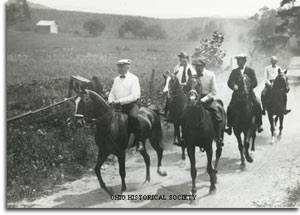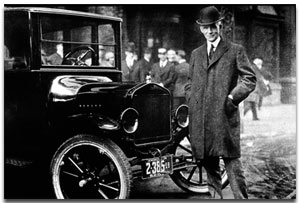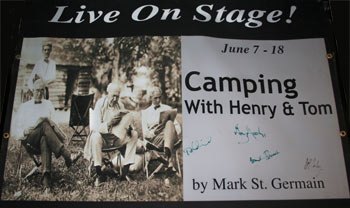The Vagabonds End Their Two Week Vacation in Western Maryland
By Francis Champ Zumbrun
Note: This is the last of eight articles covering a time in the summer
of 1921 when Henry Ford, Thomas Edison, and Harvey Firestone camped for two
weeks in western Maryland. This article finds the Vagabonds, a term the wealthy
captains of industry called themselves when they camped together at “Camp
Harding” (along Licking Creek, about six miles east of Hancock, in Washington
County) where they stayed from July 21 to July 27, and at present day Swallow
Falls State Park from July 27 to July 31. Question to Consider (The answer is at
the end of the article): What off-Broadway play production, seen at the
Cumberland Theater in June 2006, celebrates the Vagabond’s 1921 camping trip in
western Maryland?
“The common sense thing to do is to take the coal out of the
mines and take all the by-products- light oils, coke, tar, benzyl, gas, etc.. We
do that in Detroit. We use 3,000 tons of coal a day and we have enough valuable
by-products left over after using everything we need in our plants to sell coke
to the city of Detroit and put gas in the city gas mains.” - Henry Ford at Muddy
Creek Falls, 1921
 On the afternoon of July 28, Harvey Firestone went horseback riding with
family members. The horses they rode were borrowed from the party of Ralph
Emerson “Froggy” Cross, who was surprised to discover the famous men camping at
Muddy Creek Falls while horseback riding. Upon his return, Firestone generously
paid Emerson with several ten and twenty dollar bills. Emerson’s party was
extremely happy with this handsome payment, as they had paid only $1.25 to rent
each horse from an Oakland stable.
On the afternoon of July 28, Harvey Firestone went horseback riding with
family members. The horses they rode were borrowed from the party of Ralph
Emerson “Froggy” Cross, who was surprised to discover the famous men camping at
Muddy Creek Falls while horseback riding. Upon his return, Firestone generously
paid Emerson with several ten and twenty dollar bills. Emerson’s party was
extremely happy with this handsome payment, as they had paid only $1.25 to rent
each horse from an Oakland stable.
When they returned to Oakland, Froggy and his friends spread the news around
the community that the celebrated men were camping nearby at Muddy Creek Falls.
Soon, crowds of people came to see the Vagabond’s at their campsite.
Newspaper reporters covered the Vagabonds camping adventures for a national
audience anxious to read about the outdoor exploits of these well-known men.
Possibly energized by Muddy Creek Falls, Edison was very talkative, especially
to reporters, and some of his quotes are covered in this series of articles.
Being business men, the Vagabonds knew the value of good public relations.
 One writer said it best: “With squads of news writers and platoons of
cameramen to report and film the posed nature studies of the four eminent
campers, these well equipped excursions…were as private and secluded as a
Hollywood opening, and Ford appreciated the publicity.”
One writer said it best: “With squads of news writers and platoons of
cameramen to report and film the posed nature studies of the four eminent
campers, these well equipped excursions…were as private and secluded as a
Hollywood opening, and Ford appreciated the publicity.”
On July 29, the Vagabonds relaxed around the camp, exploring and studying
nature, resting, and relaxing in the company of their friends, simply
appreciating and enjoying the resplendent riches of nature at Muddy Creek Falls.
Ford, proud of his skills with an axe, could be depended on to provide
firewood for the evening campfire. An avid bird-watcher, Ford often went for
nature walks with his binoculars to see what he could discover. Edison would
sometimes walk with him to study the flow of a stream nearby, and together
consider its potential for generating electricity.
Edison liked to relax around camp by reading newspapers and books. He was
often found reading in the front seat of one of the touring cars. At other times
he might be seen lying on the ground taking a nap under the shade of a tree. For
exercise, Edison often strolled around the camp with a hammer, pounding on rocks
to see what minerals were inside; at other times, he could be found examining
plants, pondering their chemical make-up, and how they could be converted into
something useful for humanity.
Firestone enjoyed visiting nearby towns to study local industries. He liked
to take showers in town before returning to camp. In contrast, Ford and Edison
took pleasure in bathing in nearby streams, as they did at Muddy Creek and
Licking Creek.
On July 30th they tried to leave their Muddy Creek Falls campsite to travel
to their next campsite at Elkins, West Virginia, but heavy rains lasting for
hours made the roads muddy and impassable, forcing them to remain another day at
camp. Here, they celebrated Henry Ford’s 58th birthday at Muddy Creek Falls.
With John Burroughs, “the saintly lover of nature,” passing away at the age
of 83 early in 1921, Edison, at 74 years of age, was now the oldest Vagabond,
and Firestone, at 52 years of age, the youngest.
Finally, on July 31, weather conditions improved for the Vagabonds to break
camp at Muddy Creek Falls. With the bridge repaired, the roads still muddy but
drivable, they headed for Elkins, West Virginia.
Arriving late in the day, and because their camping gear had not yet arrived,
the Vagabonds stayed overnight in a hotel at Elkins. The next day, on August 1,
their camping equipment arrived, so they set up camp along the Cheat River near
Elkins. Here, both Ford and Firestone received messages to return home to take
care of important business matters.
The next morning, on August 2, they broke camp and traveled north to
Fairmont, where they arrived around noon. They intended to go on to Wheeling,
but heavy rain caused them to take a detour through Morgantown, West Virginia,
to Uniontown, Pennsylvania, where they stayed overnight at the Summit Inn along
Route 40.
Ford and Edison were in such great humor, that like children, they played
competitive games at the Summit Inn. One game demonstrated flexibility skills.
Edison, at a young age of 74, demonstrated his dexterity in the hotel lobby by
kicking a cigar off the fireplace mantle three straight times, while the younger
Ford could only do it once.
Another game immediately followed involving a stair-jumping contest in the
hotel lobby. Ford won this game, jumping up ten steps in two hops, where it took
Edison three hops to accomplish the same. Their child-like natures in their
senior years possibly reveal the secret to the incredible creativity of Ford and
Edison.
The next morning, On August 3, they departed the Summit Inn and continued
their jubilant journey to nearby Uniontown, where they stopped briefly on
Morgantown Street. From here they went on to Pittsburgh, Pennsylvania, where
Ford, Firestone, and Edison parted ways, ending their most excellent expedition
in western Maryland, West Virginia, and Pennsylvania.
The Vagabonds last annual summer expedition occurred in 1924. “The trips were
great fun,” Ford later wrote, “except they began to attract too much attention.”
The Vagabonds were getting older, and their growing business enterprises made it
more difficult to leave for long periods at a time.
The Vagabonds were finding it increasingly difficult to find solitude in the
outdoors, as additional family members and friends came along with each passing
year, making logistics and travel plans more difficult. Each summer more and
more of the public and press visited their camp sites. There was little time for
rest, relaxation, and exploration.
The Vagabonds well-publicized summer adventures caused a sensation and
stirred a national movement for motor touring and camping. The thing to do was
“to buy a Ford car and then some camping equipment and see America first.” They
popularized the idea of camping on wheels in far-away places, creating demand
for the acquisition of additional public lands for forests and parks where the
general public too could camp and recreate in the outdoors.
 Today, millions of vacationers take their automotive wheels on the road,
supporting an enormous outdoor recreational industry that annually contributes
billions of dollars to our national economy.
Today, millions of vacationers take their automotive wheels on the road,
supporting an enormous outdoor recreational industry that annually contributes
billions of dollars to our national economy.
The Vagabonds often looked back at their summer in 1921 camping in the
mountains of western Maryland as one of their most memorable camping trips.
Answer to question: “Camping with Henry and Tom” by Mark St. Germain. The
Cumberland Theater presented an excellent production of this play in June, 2006,
the same year the centennial celebrations occurred
for Maryland’s state forests and parks.
Photographs:
Warren G. Harding, Harvey Firestone, Thomas Edison and Henry
Ford horseback riding through Maryland during a camping trip in 1921. Henry Ford
with his Model T
"Camping with Henry & Tom" Playbill from June 2006, by Mark St. Germain
Acknowledgements:
Retired Maryland State Forester Francis Champ Zumbrun, author, was the Manager of Green Ridge State Forest.
This is the eighth and last part of an occasional series about Thomas Edison,
Henry Ford and Harvey Firestone’s travels to Western Maryland,
originally published in the Cumberland Times News.
Back to Travelers Page